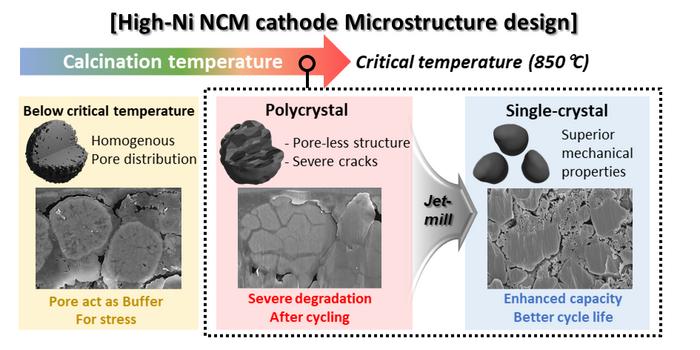A breakthrough in battery technology could pave the way for electric vehicles capable of traveling up to one million kilometers on a single charge. Researchers at Pohang University of Science and Technology (POSTECH) have developed a method to create more durable cathode materials for lithium-ion batteries, potentially extending their lifespan significantly.
The Secret Lies in Single Crystals
The research team, led by Professor Kyu-Young Park, focused on improving nickel-based cathode materials commonly used in electric vehicle batteries. Traditional nickel cathodes have a polycrystalline structure made up of many tiny crystals. This structure can degrade over time, limiting battery life.
To solve this problem, the team explored creating cathode materials as single large particles, or “single crystals.” These single-crystal materials are known to be more structurally and chemically stable, but the exact process of creating them has been unclear until now.
Finding the ‘Critical Temperature’
The key to the POSTECH team’s discovery lies in identifying a specific “critical temperature” for synthesizing high-quality single-crystal materials. By systematically testing various synthesis temperatures, they found that materials created above this critical point formed superior single crystals.
This process, called “densification,” occurs above the critical temperature. It causes the internal grain size of the material to increase and fills empty spaces within the material densely. The result is an extremely hard, degradation-resistant single crystal that could significantly extend battery life.
Professor Kyu-Young Park stated, “We have introduced a new synthesis strategy to enhance the durability of nickel-based cathode materials.” He added, “We will continue our research to make secondary batteries for electric vehicles cheaper, faster, and longer-lasting.”
This research represents a significant step towards creating more durable and efficient electric vehicle batteries. If successfully implemented, it could lead to EVs capable of traveling much farther on a single charge and lasting for many more years before requiring battery replacement.
The study, published in ACS Materials & Interfaces, was supported by POSCO Holdings and the Basic Research Program of the Ministry of Science and ICT. As electric vehicle adoption continues to grow worldwide, innovations like this could play a crucial role in making EVs more practical and appealing to consumers.
If our reporting has informed or inspired you, please consider making a donation. Every contribution, no matter the size, empowers us to continue delivering accurate, engaging, and trustworthy science and medical news. Independent journalism requires time, effort, and resources—your support ensures we can keep uncovering the stories that matter most to you.
Join us in making knowledge accessible and impactful. Thank you for standing with us!

